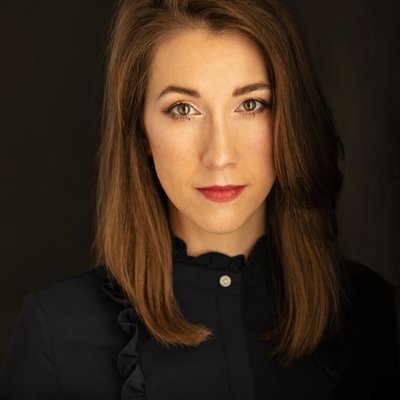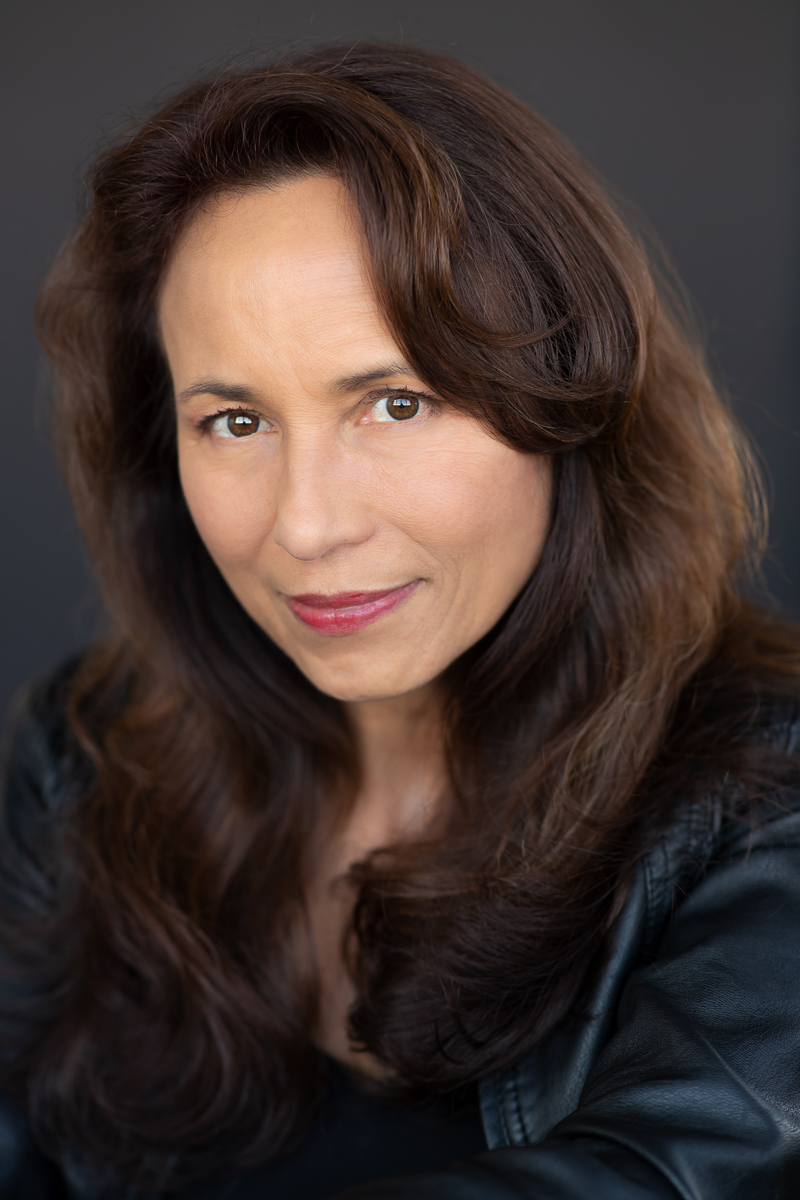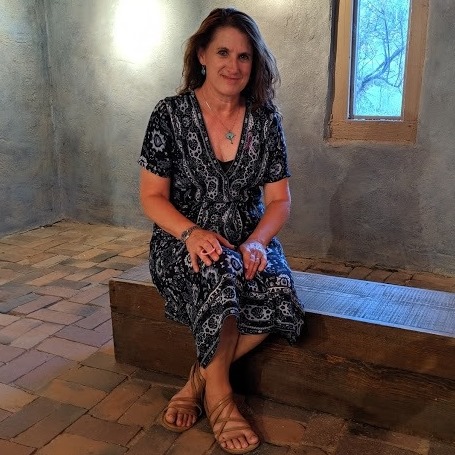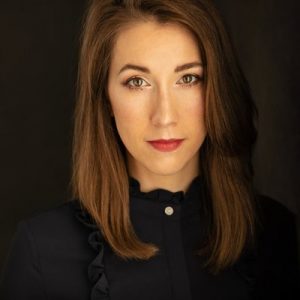 As a reader, newcomer Meghan Holloway has always loved thrillers and historical fiction. As an author, she does a masterful job of blending the two into a fast-paced and moving debut novel “Once More Unto the Breach,” the story of a jaded WWI veteran’s search for his estranged son across war-torn France at the end of WWII. I sat down with her recently to talk about the book, writing historical thrillers and the joy of working with a small publishing house.
As a reader, newcomer Meghan Holloway has always loved thrillers and historical fiction. As an author, she does a masterful job of blending the two into a fast-paced and moving debut novel “Once More Unto the Breach,” the story of a jaded WWI veteran’s search for his estranged son across war-torn France at the end of WWII. I sat down with her recently to talk about the book, writing historical thrillers and the joy of working with a small publishing house.
Open Mic: Tell me about your book, “Once More Unto the Breach.”
Holloway: “Once More Unto the Breach” is about a Welsh veteran of WWI who is searching for his missing estranged son in France in the wake of the liberation of Paris. I would call it a story about home and family, loss and hope. It’s about the regret we carry with us and the lengths we will go to for those we love.
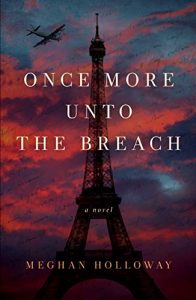 Open Mic: A lot of writers worked on their first novel for years before they were able to get published. How long was this process for you?
Open Mic: A lot of writers worked on their first novel for years before they were able to get published. How long was this process for you?
Holloway: I began writing this story in 2014, but soon after that I started grad school and I put my non-academic writing on the back burner. In the two years I spent working on my masters, I was also conducting the research I needed to do for the story. I really set pen to paper seriously for “Once More Unto the Breach” in 2017. I began submitting to agents in January of last year, and I signed with my phenomenal publishing house, Polis Books, last September. It was a four-year process with the researching and writing and about a year-long process for submitting.
Open Mic: Can you describe how you felt when you got your book deal? Was it exhilaration? Fear? Relief? All of them?
Holloway: I don’t think a single word could fully encapsulate that feeling. I would say that I was ecstatic. It is this feeling of exhilaration and intense joy that your hard work and your dreams have paid off and someone has seen as much potential in your work as you do. It’s an incredible feeling.
Open Mic: Do you have an agent?
Holloway: I do not have an agent. I approached agents, but then I also reached out to independent publishing houses that you can submit to unsolicited, without an agent, and I had great success with Polis.
Open Mic: That’s great. Maybe describe for me a little bit about how that went for you and how you choose them.
Holloway: I actually came across Polis Books on Twitter. I love small independent publishing houses. I love the movement of being more inclusive and not having so many gate keepers. Jason Pinter [Polis founder] is a phenomenal writer himself, and he has been fantastic to work with. I actually submitted directly to him via email. It was a several month process, and it has been a great experience working with him. One of the reasons I choose Polis is because they are small and independent, but they also have incredible reach and influence in the industry.
Open Mic: What has been the most surprising or challenging thing for you so far about the business? What has been the best?
Holloway: I think that writers in general tend to be introverts. We are solitary creatures who don’t like the spotlight right in our eyes, and so I think the most challenging part is the marketing side. Putting yourself out there and engaging with people and trying to build a brand – that’s the hardest part for me. On the flip side, that also leads to the most rewarding part: Connecting with people and building rewarding relationships with not just readers, but with bloggers and other authors. It’s definitely two sides of one coin.
Open Mic: What is your writing process like? Do you write a certain number of words per day? At a set time?
Holloway: I mainly write in the mornings because I find that my brain works better before I spend the entire day at my day job. My thoughts are fresher and I am more creative in the mornings. I get up and go for a swim, I get ready for the day and then I sit down and write. I usually write for about an hour, and I generally aim for anywhere between 700-1,200 words a day. If I write a little less than that, I try not to be too hard on myself; if I write more than that, it’s a great day. I think the main thing about writing is you have to diligent about it. You have to make the time to set aside and put something on paper. I don’t recall who said it but a blank page doesn’t edit itself, you have to have the words there.
Open Mic: Did you use a professional freelance editor anywhere in this process? Or did you just rely on writing groups or beta readers?
Holloway: I did not use a professional freelance editor, although I think they are a great resource. I have a friend who is a fantastic critique partner, and he reads my work chapter by chapter. He gives me invaluable insight not just into grammatical edits, but into structural edits as well. I do think you need a partner in your writing to come behind you and read what you’ve written, because as the writer you can never see your work 100 percent clearly. You are never going to be fully objective about your writing, and you need someone to be blunt with you about it.
Open Mic: Let’s talk about language. Your narrative flows so beautifully, but still feels economical, with no wasted words. Writers sometimes fall in love with the beauty of sentences over their value to the story. Do you ever struggle with that? And if so, how do you overcome it?
Holloway: I love lyricism in writing both as a writer and as a reader. I strive for vividness and for a very sensory reading experience when I’m writing, but it is a challenge to not get caught up in the writing itself. I have to also remember that I am a storyteller. I try to keep the idea in the back of my head that regardless of how lovely a sentence flows, how beautiful it is on the page, it still needs to move the plot forward. If it doesn’t, I need to be ruthless in cutting it despite how pretty it is. That’s not easy and it takes a lot of practice, but one thing that helps is that once I finish a draft I usually print it out on paper and go through it and read it aloud. That helps me figure out how well the story flows, and also where I need to cut out the loveliness and get back to the plot.
Open Mic: Which is harder for you – plot or character development?
Holloway: Developing the plot is more challenging for me. In a thriller there is so much weight and emphasis on a plot. Is it driving? Is it taut? Does it have engaging ebbs and flows and, most importantly, does it make sense and is it believable? I feel like the character comes to me fully realized in my head, and then the key is to get that plot arc just as smooth and just as fully realized.
Open Mic: Do you ever suffer from writer’s block? If so, how do you get through it?
Holloway: I like to say that I don’t believe in writer’s block. But I do believe that sometimes writing can feel like you are in the midst of a hedge maze. At that point, you need to step back and take what I call an aerial view of that maze to remind yourself of the whole picture. That’s why I always have at least a basic outline of the plot points I am aiming for in the story. I know which point in the plot that I am trying to climb towards. But if I am feeling particularity frustrated or stymied, my go-to remedy is to take my poodle out for a long walk. Sunshine, fresh air, exercise, and walking with my dog helps every time.
Open Mic: What was your inspiration to write in this genre? Have you always loved history?
Holloway: I do love history, and even more than that I love the World War era. That entire first half of the 20th century speaks to me. I grew up hearing my grandparents’ stories of the Second World War. I had a number of great uncles who were in the European theatre, and each one came back so marked from their experiences. It was such a period of tumult and horror on a global scale that had never been seen before, and it was met with this incredible tenacity and courage. There is a reason that generation is called the Greatest Generation. But this period also shaped several generations in their art, literature, philosophy, politics, everything. The World Wars had such an influence on society, and you still feel that influence today. I find that period of history such rich, rich fodder for the intensely human story.
Open Mic: Historical fiction can encompass any number of genres – romance, thriller, mystery and on and on. Will you stay focused on the thriller aspect of historical fiction, or are you interested in exploring other genres as well?
Holloway: I love the research and detail and setting of historical fiction, but my go-to genre as a reader is the thriller genre. I love the pace and the tension of thrillers, and I love the sweeping character dramas you can write with a historical. I will never say never to any future writing projects, but at this point, everything in the works is either a contemporary or historical thriller.
Open Mic: There is so much focus now on diversity in writing, and whether writers of one culture or gender should be writing characters of another. Did you have any concerns or struggles writing a lead character that was male?
Holloway: My concern and struggle with writing a male protagonist was that I wanted to ensure that his perspective reads authentically. I think that is everyone’s concern when they are writing a voice that is not their own. Not only was I dealing with a male character, I was also dealing with one who did not have a modern mindset, one whose background was extremely rural, one who was Welsh, and one who was a veteran of one of the most brutal and catastrophic wars ever fought. So writing Rhys was a challenge for me, but it was also incredibly rewarding to step into the different perspective that was so different from mine. I think that writers at heart are explorers. We are forever forging into new territory and fleshing out different experiences. If we only wrote what we know, what we have lived ourselves, the world would be far short of the great stockpiles of literature in existence.
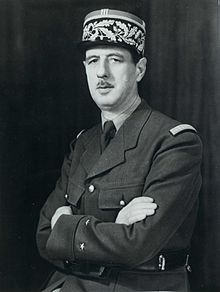 Open Mic: I like to end on what I hope is a fun note. Let’s say I could put you together for dinner and a conversation with just one of the following three people. Who would you choose, and why? Your options are: French General/President Charles de Gaulle, actress and inventor Hedy Lamarr, or the great author Pat Conroy.
Open Mic: I like to end on what I hope is a fun note. Let’s say I could put you together for dinner and a conversation with just one of the following three people. Who would you choose, and why? Your options are: French General/President Charles de Gaulle, actress and inventor Hedy Lamarr, or the great author Pat Conroy.
Holloway: Given my subject matter I would have to go with Charles de Gaulle. If I could sit down and have dinner with him, I would come away with a wealth of fodder for stories from hearing his perspective on living through so much history, fighting in the First World War, and then having that insider view of what was going on both in the trenches and in the bureaucratic side of WWII. He would be a phenomenal resource.

